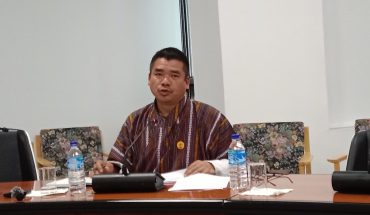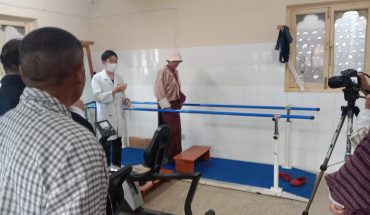
TASHI LHAMO
Thimphu
The Government has allocated a total budget of Nu. 600 million for enhancing public service delivery during the 13th FYP. Of this amount, Nu. 77 million has been specifically earmarked for the enhancement of Community Service Centers.
In 2024, the government carried out a detailed review of the operations of the Community Service Centers and the status of service delivery at the grassroots.
One of the key findings of the review was that the Community Service Centers were more aligned with banking services and non-government-to-citizen services than with the actual delivery of public services. Additionally, it was observed that the management of the CSCs had undergone several changes.
Initially, Bhutan Postal Corporation Limited managed the CSCs from December 2011 until February 2015. In March 2015, their operation was transferred to Bhutan Development Bank Ltd (BDBL). After the launch of the National CSI Development Bank (NCSIDB) on July 1, 2020, the responsibility for the CSCs was transferred to NCSIDB. However, following the amalgamation of NCSIDB with BDBL in October 2023, management of the CSCs was once again assigned to BDBL.
This constant change in management and mandate of the CSCs has evidently led to a lack of clarity and emphasis on public service delivery. Against this backdrop, the Lhengye Zhungtshog, during its 17th session held on June 13, 2024, decided to place ownership of the Community Service Centers under the Local Governments, shifting the emphasis back to enhancing citizen-centric public service delivery at the community level.
Subsequently, on 23rd August, 2024, Lyonpo Lekey Dorji, Minister of Finance, formally handed over the operations of Community Service Centers to the Gewog Administrations through a virtual meeting with the Gups, CEO of BDBL, and officials of the Ministry of Finance, Ministry of Home Affairs and Cabinet Secretariat.
On 29th October 2024, an informal discussion was held between RCSC and Cabinet Secretariat to discuss the way forward on the service conditions and merger of CSEs into the civil service where RCSC expressed concerns on the direct absorption of CSC staff and how it might not be in line with Bhutan Civil Service Rules.
The meeting, however, agreed that a detailed proposal be presented to the RCSC by the Cabinet Secretariat. In this regard, the Cabinet Secretariat has formed a working group comprising relevant officials from the Prime Minister’s Office, the Ministry of Finance, and the Ministry of Home Affairs.
The proposal will cover the status of the CSC operators, their entry into the civil service, position levels, terms of reference & job descriptions, and service conditions.
Initially, 203 Community Service Centers (CSCs) were established in 203 Gewogs out of the total of 205 Gewogs in the country, and an additional CSC in Thimphu Thromde. Hungrel Gewog in Paro and Chang Gewog in Thimphu did not meet the CSC criteria of a minimum of a five-kilometre radius of Thromde. It was understood that citizens in these areas could access public services in urban centers.
Additionally, three CSCs in Laya, Lingzhi, and Soe Gewogs remained vacant due to the lack of electricity and internet connectivity. Over time, some CSC operators resigned.
In 2022, the NCSIDB recruited five additional operators: three were deployed to the previously vacant CSCs in Laya, Lingzhi, and Soe, while two replaced operators who had resigned in Yurung and Sakteng. This brought the total number of operators to 183. However, 23 CSCs remain vacant.
Recruitment for these vacancies, which was being handled by BDBL on a case-by-case basis, was put on hold due to management changes. The recruitment of CSCs will be carried out, following the completion of ongoing discussions with the RCSC.
After the handing over of CSC management to Gewog Administrations, the provision of computers and peripheral equipment for the CSCs is looked after by the respective Gewog Administrations. As per the directives from the Committee of Four Coordinating Secretaries (C4CS) the respective Gewog Administrations are to provide the CSCs with the required equipment using funding from the Gewog Block Grant. The Public Service Delivery Division under the Prime Minister’s Office (PSDD) will continue to provide technical backstop assistance in escalation of unresolved services and capacity building of the CSC operators.
That said, the government will continue to support the existing community centers including the 23 vacant centers, during the 13th FYP as broadly with the capacity building of all service delivery of officials and frontline staff, assessment of service delivery workplace and equipment required at frontline offices and develop and implement a Standard Operating Procedures that applies to all the service delivery officials.
The Cabinet Secretariat is in the process of developing a comprehensive training module for all the frontline officials who have direct interface with the public.
This training module will include all Government-to-Citizen (G2C) services along with services that are not listed on the G2C website. These unlisted services will include GovBiz (Government-to-Business) services, Thromde services, and a host of offline government services that do not have online systems.
The capacity building for CSC operators will also include Standard Operating Procedures of all public services, system navigation for the services, and the Service Providers’ Best Practices which include understanding service seeker, behavioural patterns and service seeker psychology, empathy and communication skills, and dealing with difficult clients via stress and anger management.
Similarly, the govt has already completed the training of CSC operators on the Economic Stimulus Program (ESP) loans.
The Cabinet Secretariat is working closely with The GovTech Agency in developing a comprehensive public service blueprint; this will serve as the basic framework for all public services, including how services are designed, their delivery framework and their related system integration. This blueprint will be used in all agencies and CSCs to further strengthen service delivery.
Additionally, the Cabinet Secretariat, in collaboration with HELVETAS and the Department of Local Governance and Disaster Management, initiated service delivery to Chiwog level by engaging dropout youths by providing required materials and backstopping to enhance the public services at grassroots level. This is currently being piloted in Trong and Bardo gewogs of Zhemgang.
Originally, the core mandates of CSCs have always been aimed at providing Government-to-Citizen services at the grassroots. However, the frequent changes in CSC management had brought about an unintended shift of the role of the CSC operators to become more aligned towards banking services.
After the handing of CSC operations to local governments, banking services have fallen outside of the administrative purview of CSC operators since the management of financial institutions is completely different from Governmental agencies.





